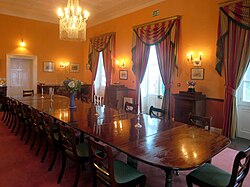Plantation House, Saint Helena



Plantation House is the official residence of the governor of Saint Helena. It is located 3.6 km (2.2 mi) to the south of the capital, Jamestown, on the island of Saint Helena.
History
[edit]The house was built 1791-2 by the East India Company, as a "country" or summer residence for the governor. The company governed the island until 1834, when it became a crown colony, although governors of the island have continued to use the property since. Administration of the island is generally carried out from Jamestown, notably at The Castle (historically the governor's residence which then became the "town" residence). An explanation for the location of the governor's official residence is the less arid climate and terrain found further inland, compared to in James Valley. The (summer) residence of the lieutenant governor was Longwood House, also inland from Jamestown.
The house was extended most dramatically in 1816 and considerable alterations, mostly external, were made in 1960. The roof was originally slate but, like with most buildings on the island, this has been replaced with metal sheeting. It is designated as a Grade I listed building.[1] Tours of the state rooms are available by appointment.
Tortoises
[edit]Possibly the world's oldest living tortoise, named Jonathan, resides in the grounds and belongs to the government of Saint Helena.[citation needed] He potentially could also be the last living example of his species. The grounds are home to at least five giant tortoises and are open to visitors at any time.
Neighbourhood
[edit]The house is situated in the district of St Paul's and nearby is St Paul's Cathedral, also a Grade I listed building.
References
[edit]- ^ "Land Planning and Development Control Ordinance – Appendix 3: Listed Buildings" (PDF). Archived from the original (PDF) on 30 January 2012.
External links
[edit]- Saint Helena Island Info, Plantation House
- Saint Helena government The Tortoises at Plantation House
- Flickr Plantation House in 2010
- Plantation House with the old Country Church behind, c. 1812